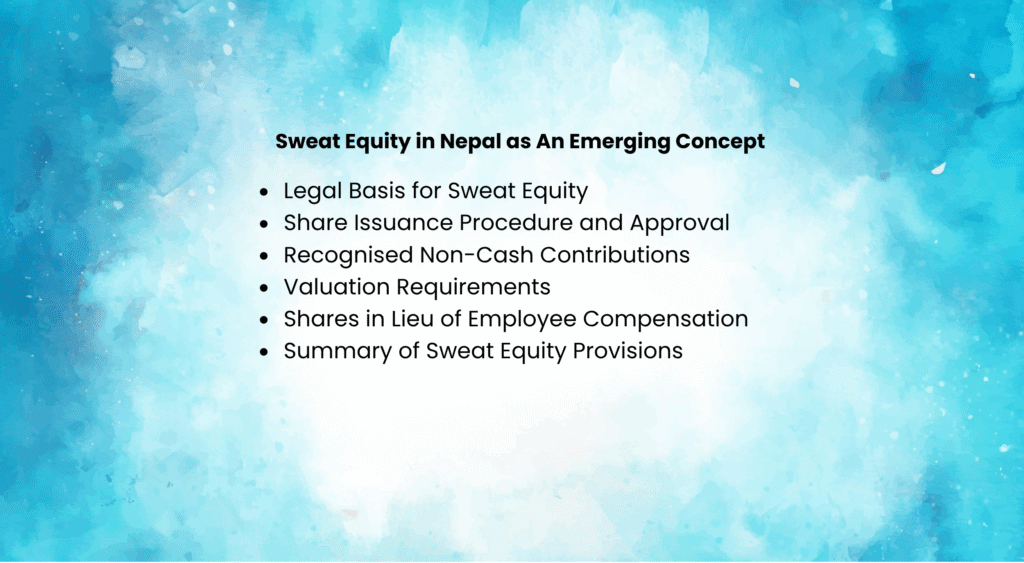Sweat equity, a transformative concept in Nepal’s corporate landscape, empowers entrepreneurs and startup founders to reward valuable contributions, such as expertise, skills, intellectual property, or services, with ownership stakes rather than cash. In a modern business environment where talent, innovation, and dedication often outweigh financial investment, sweat equity enables companies to attract and retain talent while fostering entrepreneurship.
Traditionally, ownership in Nepalese companies was based solely on capital investment. However, this model often fails to recognise the critical non-monetary contributions that drive the success of startups, technology ventures, and knowledge-based businesses. Recognising sweat equity aligns Nepal’s corporate framework with international best practices and encourages innovation-driven growth.
What is Sweat Equity in Nepal?
In Nepal, the business environment is evolving into a more dynamic and inclusive one, fostering concepts like Employee Stock Ownership Plans (ESOPs) and sweat equity, which are gaining legal recognition.
A landmark development occurred with the recent amendment to the Companies Act, 2063, formally acknowledging sweat equity.
The amendment, through Sections 18 (3A) to (3E) of the Act titled “An Act to Amend Certain Nepal Laws to Improve the Economic and Business Environment and Increase Investment” (published in the Nepal Gazette on Chaitra 18, 2081 / March 31, 2025), allows companies to reward non-financial contributions with equity for the first time in Nepal.
This change is reshaping traditional ideas of business ownership, particularly for startups and emerging ventures, by legally recognising the value of expertise, effort, and innovation in building company equity.
Unlike ordinary shares bought with money, sweat equity recognises that value comes in many ways. For example:
- An entrepreneur building a business from Scratch
- A software developer creating essential technology
- A marketing professional establishing brand visibility
- A consultant providing strategic advice at reduced fees
Why Sweat Equity Matters in Nepal?
Sweat equity is essential for Nepal’s startups and emerging businesses because it rewards contributions beyond cash.
- Supports Startups – Helps new ventures attract talent without straining limited funds.
- Attracts and Retains Talent – Offers employees ownership, reducing brain drain.
- Recognises Diverse Contributions – The Nepali business landscape values a variety of contributions, including skills, expertise, and innovation, alongside capital, making everyone feel appreciated for their unique role in the company’s success.
- Aligns Interests – Equity ownership motivates long-term commitment and better decision-making.
- Encourages Innovation – Rewards creative problem-solving and risk-taking, fostering growth.
Sweat equity ensures that effort, expertise, and innovation are recognised, aligning contributors’ interests with the company’s success.
Global Practices and Precedents of Sweat Equity
Sweat equity is widely used in global startup ecosystems, providing valuable insights for Nepal’s evolving business landscape. Recognising non-monetary contributions helps startups attract talent, reward innovation, and align interests without heavy financial outlay.
United States
In the U.S., founders and employees often receive equity for their contributions. Stock options and restricted stock units (RSUs) are common, aligning employee incentives with company growth and fostering long-term commitment.
Sweat equity has become a cornerstone of the U.S. startup ecosystem, particularly in technology and innovation-driven businesses.
United Kingdom
UK companies can issue shares for non-cash contributions, including services or intellectual property. Strict valuation and disclosure requirements ensure transparency and investor protection.
The framework balances flexibility for startups with governance safeguards.
Singapore
Singapore encourages entrepreneurship through its Companies Act, supporting sweat equity for contributions like expertise, technology, or strategic guidance.
This approach ensures fair compensation while promoting innovation and talent retention.
India
India formally recognises sweat equity under the Companies Act, allowing shares to be issued to directors or employees at a discount or for non-cash contributions.
The law specifies valuation, disclosure, and regulatory requirements, protecting shareholders while rewarding key contributors. India’s framework has influenced Nepal and other South Asian countries in adopting similar provisions.
Globally, sweat equity demonstrates that ownership based on effort, expertise, and innovation is as valuable as financial capital. Nepal’s adoption of this concept aligns the country with international best practices, supports startups, attracts talent, and fosters sustainable business growth.
Sweat Equity in Nepal as An Emerging Concept
Nepal has taken a progressive step by formally recognising sweat equity in its corporate law.
Through the amendment to the Companies Act, 2063, published in the Nepal Gazette on Chaitra 18, 2081, companies can now issue shares in exchange for non-cash contributions, providing a legal mechanism to reward talent, expertise, or other valuable inputs without immediate cash outflow.
This is especially beneficial for startups and innovative companies.
Legal Basis for Sweat Equity
The amendment introduced Sections 18 (3A) to 18 (3E), which explicitly allow companies to issue shares for non-monetary contributions even after incorporation.
- Section 18(3A) – Companies may issue shares or grant rights to acquire shares to promoters or others in any form other than cash, enabling late-stage involvement of key contributors without financial investment.
Share Issuance Procedure and Approval
Issuance of sweat equity requires proper corporate approvals:
- Section 18(3B) – A special resolution at a general meeting is mandatory before issuing or selling shares for non-cash consideration.
- Shares may be issued at a discount, providing flexibility in valuation.
- This ensures transparency and shareholder consent.

Recognised Non-Cash Contributions
Under Section 18(3C), companies can issue shares in return for several types of intangible contributions:
- Intellectual property, patents, or software
- Technical know-how or specialised expertise
- Services or professional work
- Tangible assets or other valuable inputs
These contributions are now legally compensable with equity, aligning contributors’ interests with the company.
Valuation Requirements
Fair valuation is essential to ensure that sweat equity is issued correctly:
- Technical/physical contributions – Assessed by a certified engineer
- Financial or service contributions – Valued by a professional accountant using appropriate benchmarks and models
Valuation determines the number of shares allocated to the contributor based on their contribution’s monetary worth.
Shares in Lieu of Employee Compensation
- Section 18(3D) – Companies can issue shares to employees instead of salary, allowances, or other benefits, provided a written agreement exists.
- This allows companies to manage cash flow while still rewarding employees meaningfully.
Summary of Sweat Equity Provisions
Here is the summary of the provisions which are amendments of the Companies Act 2063 for covering the sweat equity:
| Section | Provision | Key Details |
|---|---|---|
| 18(3A) | Legal Basis | Shares can be issued for non-cash contributions after incorporation |
| 18(3B) | Shareholder Approval | Requires special resolution, shares may be issued at a discount |
| 18(3C) | Recognised Contributions | Intellectual property, know-how, services, assets, and other intangible inputs |
| 18(3C) | Valuation | A certified engineer, such as a technical/physical accountant (financial), determines value |
| 18(3D) | Shares as Compensation | Shares can replace salary, allowances, or benefits if agreed in writing |
| 18(3E) | Issuance Cap | 20% of paid-up capital for general companies, 40% for startups |
Advantages of Sweat Equity
Here are some advantages of sweat equity in Nepal:
| S.N. | Advantage | Explanation |
|---|---|---|
| 1. | Promotes Creativity & Entrepreneurship | Encourages startups to innovate and build strong teams without heavy cash outlay |
| 2. | Attracts and Retains Talent | Provides ownership incentives, helping to retain key employees and contributors |
| 3. | Strengthens Commitment | Contributors feel a sense of ownership, aligning their interests with company success |
| 4. | Supports Startup Growth | A higher equity cap of 40% for startups allows founders and early contributors to receive fair rewards |
| 5. | Preserves Cash Flow | Companies can reward contributors without spending cash, freeing up resources for operations |
| 6. | Ensures Transparency | Special resolution requirement ensures shareholders are informed and approve the issuance |
| 7. | Fair Valuation | Mandatory professional valuation ensures shares are issued at a reasonable value |
Disadvantages of Sweat Equity
Here are some disadvantages of sweat equity in Nepal:
| S.N. | Disadvantage | Explanation |
|---|---|---|
| 1. | Lack of Vesting Rules | No mandatory schedule or lock-in period for equity, which could lead to early exits |
| 2. | Ambiguous Tax Treatment | The law does not clearly define how income or capital gain tax applies to sweat equity |
| 3. | Limited Procedural Guidelines | No detailed rules on timelines, forms, or filing requirements |
| 4. | Lack of Oversight Mechanism | No formal authority to resolve disputes over valuation or eligibility |
| 5. | Potential for Misuse | Risk of undervaluing contributions to issue equity unfairly to insiders |
| 6. | Low Financial Literacy | Smaller companies may struggle to implement and manage equity arrangements properly |
Implementation Challenges of Sweat Equity in Nepal
We are discussing the challenges of sweat equity in Nepal; however, now we are talking about the possible implementation of sweat equity in Nepal:
- Low Awareness Among Entrepreneurs – Many business owners are not yet familiar with the new provisions or how to effectively apply them.
- Limited Availability of Professional Valuers – Nepal has a shortage of certified accountants and engineers with experience in valuing intangible contributions like intellectual property or specialised services.
- Absence of Detailed Regulations – Supporting procedural guidelines from the Office of the Company Registrar and other authorities are currently lacking.
- Unclear Tax Implications – Both companies and recipients face uncertainty regarding income tax, capital gains tax, or other liabilities related to sweat equity.
- Administrative and Legal Burden – The process can be complex and time-consuming without streamlined procedures, which may discourage companies from adopting sweat equity.
- Investor Concerns – Investors may perceive companies using sweat equity as higher risk if governance safeguards and valuation transparency are weak.
- Startup Certification Issues – There is no formal process to determine which companies qualify as “startup enterprises,” limiting access to the higher 40% issuance cap.
Conclusion
Sweat equity in Nepal enables companies to reward skills, expertise, and innovation with ownership stakes rather than cash.
While the legal framework under the amended Companies Act, 2063, provides clear provisions on eligibility, valuation, approval, and caps, practical challenges remain, including awareness, professional valuation, and tax clarity.
Despite these hurdles, sweat equity is a powerful tool for fostering entrepreneurship, incentivising key contributors, and supporting Nepal’s evolving business ecosystem, making it a cornerstone for innovation-driven growth.





